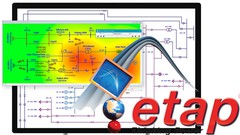.svg)
.svg)

Design, Simulate and Analyze Power systems in Etap
For Electrical / Electronics
Course Type :
₹ 14567
Session 1 | Introduction to Electrical System Design
Session 2 | Sources of Electrical Energy
Session 3 | Elements of Power system
Session 4 | Generation, Transmission and Distribution:
Session 5 | Introduction to power substation
Session 6 | Introduction to Bus bar
Session 7 | Introduction to Single Line Diagram
Session 8 | Constructing a Single line diagram
Session 9 | Single Line Diagram Examples
Session 10 | Design a Single Line Diagram
Session 11 | Introduction to ETAP
Session 12 | Working with ETAP software
Session 13 | Toolbar Description
Session 14 | Inserting Circuit Elements
Session 15 | Creating Single Line Diagram in ETAP
Session 16 | Editing a one-line diagram
Session 17 | Editing a one-line diagram
Session 18 | Design a Single line diagram
Session 19 | Modules in ETAP
Session 20 | Module – 1 Load Flow Analysis
Session 21 | Module – 2 Short circuit analysis
Session 22 | Module – 3 Motor Acceleration
Session 23 | Module – 4 Transformer Sizing
Roles in industry
Course Highlights
Copyright © 2025 ABCTrainings - All rights reserved